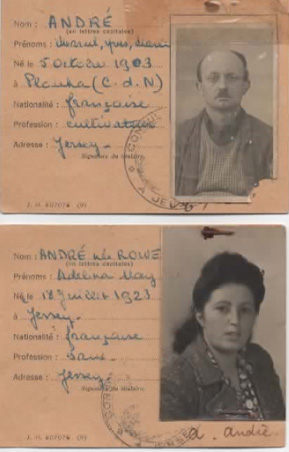During my visit to the archive, I was able to research some personal history. My Grandfather lived in Jersey throughout the occupation, however he was meant to be evacuated in June of 1940 but he did not make it down to the harbor in time and just missed the last evacuation vessel. I was able to find his German occupation Identification card within the digital archives. My Grandfathers card was issued just after his 14th Birthday in January of 1944, meaning he was 15 when the Island was liberated by the Allies. He lived at 1 Garlyckehythe lane at the bottom of Janvrin road and lived with his great aunt Maud
When my Grandfather was alive, He told me many stories of the Occupation. One such story he told me was about the time that the Island was suffering a shortage of food supplies as the majority of food made in the island was exported by the Germans to feed their front line soldiers. As a result of this, many islanders, including my grandfather, resorted to stealing food from the Germans. One night my grandfather and a friend of his snuck into a German supply post at St Saviours Court. They both found their way into the basement where they began to take all the food they could lay their hands on. They were then caught by A young German officer and I remember my Grandfather telling me he though the officer would shoot them. Instead the officer took them both upstairs, sat them down and made them a sandwich. When they had finished he halved a loaf of bread and gave a half to my Grandfather and half to his Friend and told them both to leave immediately and not come back.
Another story is of the time my grandfather and another friend were out on bikes near St Clements and heard a German bomber overhead. The bomber was suffering difficulties with its engines so the pilot decided to aim it for some fields near St Clements and jump out. The plane crashed and my grandfather and his friend arrived shortly after and decided to search the wreckage for souvenirs. Due to the heat and flames, bullets and ammunition were exploding around them as they were souvenir hunting. My grandfather came away with a few bullets from the bomber.
My grandfather also stole a German bayonet off a wall near Springfield and took it home in his jacket pocket. I will need to find it to take photos of it as I remember him showing me a few years ago.
My Grandmother lived In Jersey during the occupation as well. She lived down in Vallee Les Vaux and her mother, my great grandmother Louise actually died at the start of the occupation as she was cleaning the steps outside of her house and saw a platoon of German soldiers walking up the road and fainted and hit her head off of the steps and died on the spot.
My great grandfather kept chickens and towards the end of the occupation when German food supplies were low, many soldiers would come to my great grandfathers house in Sion and attempt to buy his chickens from him. Everytime My Great Grandfather would take the Germans Money, Spit on it and hand it back to the soldiers and tell them the chickens werent ready yet and told them to come back in a week and this went on until the end of the Occupation
My Grandmother also wrote of the treatment of local schoolchildren by the Germans. She said that the vast majority of Soldiers were only serving to protect their families and didnt actually want any involvement in war at all. If they refused to Join the German army, They would be shot along with their families so many made the sacrifice for the sake of their own families so therefore were nice to the people of Jersey. My grandma can recall one afternoon after leaving her primary school at St Johns, German officers stood on the wall outside and threw sweets down to the children. As this was early days in the occupation, Many of the children refused to eat the sweets as they thought they were poisoned
My grandmother and grandfather both had to learn German at school and follow an adapted version of their peacetime curriculum all taught and learnt in German. There were many occasions where allied aircraft would fly over the island and drop propaganda leaflets and my grandmother recalled seeing these leaflets scattered across fields in St Mary. However being caught in possession of a leaflet or any material containing details of allied progression or outside news would result in serious punishment, so my Grandmother would read them and leave them in the field.
My great grandfathers second wife, Tina was appointed as a cleaner of the Gestapos rooms at the Ritz Hotel where they had their headquarters. Whenever an officer would leave the room she was in she would use the radio to tune into the BBC world news broadcast and she would then go on to share this news with other islanders. On one occasion however, a Gestapo officer forgot his gloves and came back into the room to Tina listening to the radio and caught her. She was immediately arrested and sent to Biberac internment camp. Her then husband died shortly after, falling to his death off of a forum building he was doing works on. At the time Tina was interned, she was in the early stages of pregnancy and my great uncle peter was born in the camp and was 3 and a half when the camp was liberated. Later on, My great granddad married Tina and adopted Peter
Here is Tina’s and my Great Grandfathers Identification card. These copies make up part of my Family’s private archive as this version is the one Tina carried on her day to day as a form of identification

